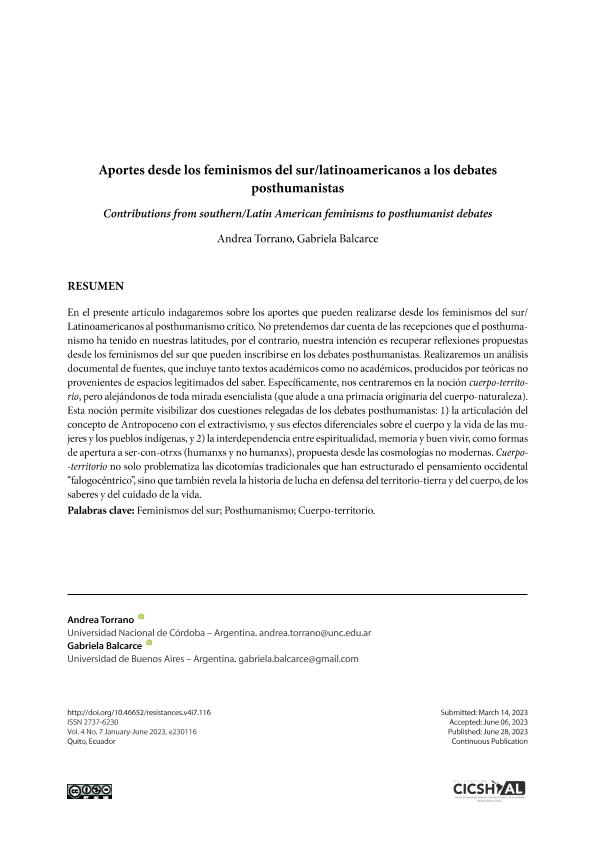Artículo
En este artículo nos interesa defender la radical importancia de los cuestionamientos del posthumanismo desde un pensamiento situado en Latinoamérica. Porque no se trata de dar cuenta de las posibles recepciones que el posthumanismo crítico ha tenido en nuestras latitudes, sino más bien intentar retomar algunas nociones claves y problemas centrales que se han visibilizado desde los feminismos del sur (decoloniales, de Abya Yala, comunitarios, populares, territoriales) y que pueden aportar a los debates posthumanistas. De esta manera, nos permitimos también cuestionar en este gesto la "cultura de la recepción", que muchas veces es alentado desde los propios feminismos académicos cuando nos limitamos a traducir, citar y hacer circular textos y voces del norte global (Alvarado, 2020: 19), olvidando las problemáticas y especificidades propias de nuestras latitudes. Esto no significa rechazar los aportes que desde estas perspectivas puedan hacerse, pero sí cuestionar el modo en que circulan los discursos, especialmente desde las reflexiones críticas que han denunciado el colonialismo -como es el caso del posthumanismo-, pero no han puesto en discusión el colonialismo académico que se sigue (re)produciendo. Es por ello que analizaremos la noción de cuerpo-territorio In this article we will inquire about the contributions that can be made from southern/Latin American feminisms to critical posthumanism. We do not intend to account for the receptions that posthumanism has had in our latitudes, on the contrary, our intention is to recover reflections proposed from southern feminisms that can be included in posthumanist debates. To do this, we will carry out a documentary analysis of sources, which includes both academic and non-academic texts, produced by theorists who do not come from legitimate spaces of knowledge. Specifically, we will focus on the notion of body-territory but moving away from any essentialist gaze (which alludes to an original primacy of the body-nature). This notion makes it possible to visualize two issues that have been relegated from post-humanist debates: 1) the articulation of the concept of the Anthropocene with extractivism, and its differential effects on the body and life of women and indigenous peoples, and 2) the interdependence between spirituality, memory and good living, as forms of openness to being-with-others (humans and non-humans), proposed from non-modern cosmologies. Body-territory not only problematizes the traditional dichotomies that have structured “phallogocentric” Western thought, but also reveals the history of the struggle in defense of territory-land and the body, knowledge, and care for life.
Aportes desde los feminismos del sur/latinoamericanos a los debates posthumanistas
Título:
Contributions from southern/Latin American feminisms to posthumanist debates
Fecha de publicación:
06/2023
Editorial:
Centro de Investigaciones en Ciencias Sociales y Humanidades desde América Latina
Revista:
Resistances
e-ISSN:
2737-6222
Idioma:
Español
Tipo de recurso:
Artículo publicado
Clasificación temática:
Resumen
Palabras clave:
CUERPO-TERRITORIO
,
FEMINISMOS DEL SUR
,
POSTHUMANISMO
Archivos asociados
Licencia
Identificadores
Colecciones
Articulos(SEDE CENTRAL)
Articulos de SEDE CENTRAL
Articulos de SEDE CENTRAL
Citación
Balcarce, Gabriela; Aportes desde los feminismos del sur/latinoamericanos a los debates posthumanistas; Centro de Investigaciones en Ciencias Sociales y Humanidades desde América Latina; Resistances; 4; 7; 6-2023; 1-15
Compartir
Altmétricas




